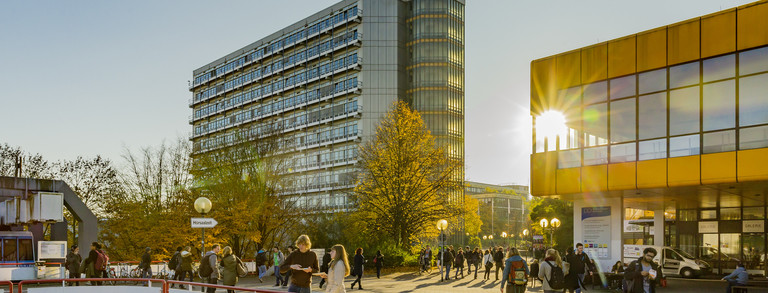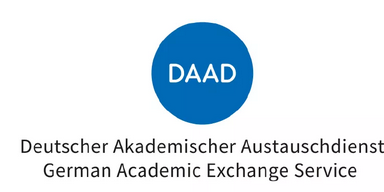Erasmus+ Study Abroad
The Erasmus+ program is a European Union success story and has been promoting the exchange of students and staff within Europe for more than 35 years. It is the largest mobility program at TU Dortmund University. The exchange of students is based on Erasmus+ agreements, which the respective department has set up with partners at other universities outside of Germany. Students can therefore use their departmental cooperations to study for one or two semesters abroad.
"Im Ausland studieren mit Erasmus+ #kurzerklärt" (video by the DAAD, in German)
TU Dortmund University students can apply if...
- they want to study abroad in one of the participating program countries,
- they are regularly/fully enrolled at TU Dortmund University,
- the department and the host university have set up an Erasmus+ Inter-Institutional Agreement.
Students receive...
- country-specific financial grants for their study period abroad (Erasmus+ mobility grant),
- social top ups, if they belong to one of the following groups
- study abroad with child/children,
- students with a disability with a GdB of 20 or more and/or chronic illness,
- first-generation students (students from a non-academic background),
- working students,
- academic recognition of academic achievements abroad,
- exemption from tuition, registration, examination, laboratory and library fees at the host university,
- support in the preparation and implementation of the stay abroad (cultural, linguistic, organizational),
- if applicable, an online language course funded by Erasmus+ from a specified provider.
27 Member States of the European Union (EU)
Austria | Belgium | Bulgaria | Croatia | Cyprus | Czech Republic | Denmark | Estonia | Finland | France | Germany | Greece | Hungary | Ireland | Italy | Latvia | Lithuania | Luxembourg | Malta | Netherlands | Poland | Portugal | Romania | Slovakia | Slovenia | Spain | Sweden
6 Program countries outside the EU
Iceland | Liechtenstein | North Macedonia | Norway | Serbia | Turkey
Partner country United Kingdom
Mobilities to the United Kingdom may continue to be funded depending on available funds, as it is eligible for funding as an Erasmus+ partner country within the framework of international mobility.
Partner country Switzerland
Mobilities to Switzerland are possible and may be funded by the Swiss side, therefore there is no Erasmus+ funding for TU Dortmund University students.
The duration of the stay depends on the months agreed in the Erasmus+ Inter-Institutional Agreement. An Erasmus+ stay can last between 60 days and twelve months. An "Erasmus+ month" is always 30 days.
The mobility must take place within one academic year (e.g. winter semester 2024/2025 and/or summer semester 2025)
- Start of mobility: first day of courses / orientation event
- End of mobility: last day of courses / examination
An extension of the mobility from one academic year to the next academic year is not possible just like that, i.e. a new application must be submitted for the next academic year and the online declaration of acceptance must be completed and submitted by March 31.
Students can be funded for a total of up to 36 months for their studies and/or internship:
- up to twelve months in Bachelor's, Master's and doctoral degree programs respectively
- the funding can be split up and used several times within a study cycle (e.g. twice for six months)
Erasmus+ also allows a combination of study and internship.
Monthly Erasmus+ funding is currently limited to either 3 or 4 months for a semester abroad. Students usually are informed about how many months are funded in the coming academic year in the middle of the year after submitting the online declaration of acceptance (deadline 31 March), as only then is it known how many students will be going abroad for how long and how much funding TU Dortmund University will receive for the Erasmus+ year.
The amount of the monthly funding rates depends on the country groups and has been set by the EU Commission for the academic year 2024/2025 as follows:
Country group 1: 600 EUR (Austria, Belgium, Denmark, Finland, France, Germany, Iceland, Ireland, Italy, Liechtenstein, Luxembourg, Netherlands, Norway, Sweden, (partner country: United Kingdom))
Country group 2: 540 EUR (Estonia, Greece, Latvia, Malta, Portugal, Slovakia, Slovenia, Spain, Czech Republic, Cyprus)
Country group 3: 540 EUR (Bulgaria, Croatia, Lithuania, North Macedonia, Poland, Romania, Serbia, Turkey, Hungary)
Special funding (Social Top Up)
The Erasmus+ program aims to promote equal opportunities and equal access, inclusion, diversity and fairness in all program actions. The DAAD has therefore designated four groups for Germany that can apply for special funding.
These groups include
- students with disabilities and/or chronic illnesses,
- students who wish to study abroad with their child/children,
- first-generation students,
- working students.
All information can be found on the website Equal Opportunities.
Those who travel sustainably (green) can also apply for an additional subsidy for up to 6 days of travel.

Contact
E-mail Inquiries
General inquiries: going-abroad @tu-dortmund.de
Erasmus+ study abroad: erasmus-outgoings @tu-dortmund.de
Office Hours
(Only) Erasmus+ Study Abroad:
Office hours via telephone/zoom Hella Koschinski: by prior arrangement
Tel.: 0231 755-6247
Office hours in presence: only with appointment
Tue 9:00-12:00
General Inquiries - Outgoings (Studies/Internships/Short Programs):
Office hours via telephone / Skype (laura-hope) / Zoom (please send a link when you are online): without appointment, open
Mon-Tue 10:00-11:30 & 13:30-15:00
Tel.: 0231 755-4728
Office hours in presence: only with appointment
New appointments will be released 14 days in advance. If no appointments are shown as available, this means that all appointments for this time period are already booked.

![Eat & Read [Translate to English:]](/storages/international/r/Bilder/Veranstaltungen/Eat___Read/waffel_plain_buecherturm.jpg)












![[Translate to English:] Bewerbung person is writing on a laptop](/storages/international/_processed_/b/c/csm_Bewerbung_64bca38ada.jpg)
![[Translate to English:] Vor | während | nach dem Aufenthalt person is writing a to-do-list](/storages/international/_processed_/d/6/csm_Vor_waehrend_nach_dem_Aufenthalt_8e63397641.jpg)